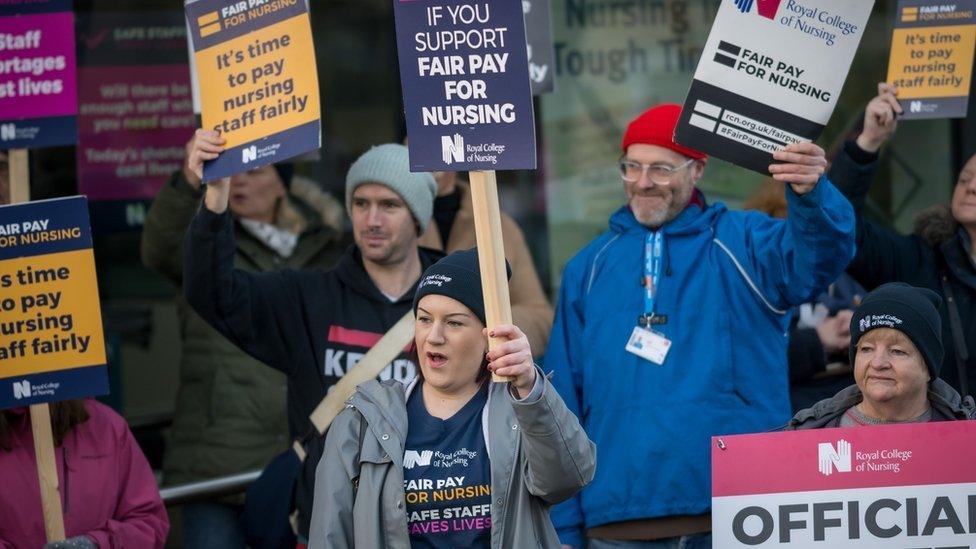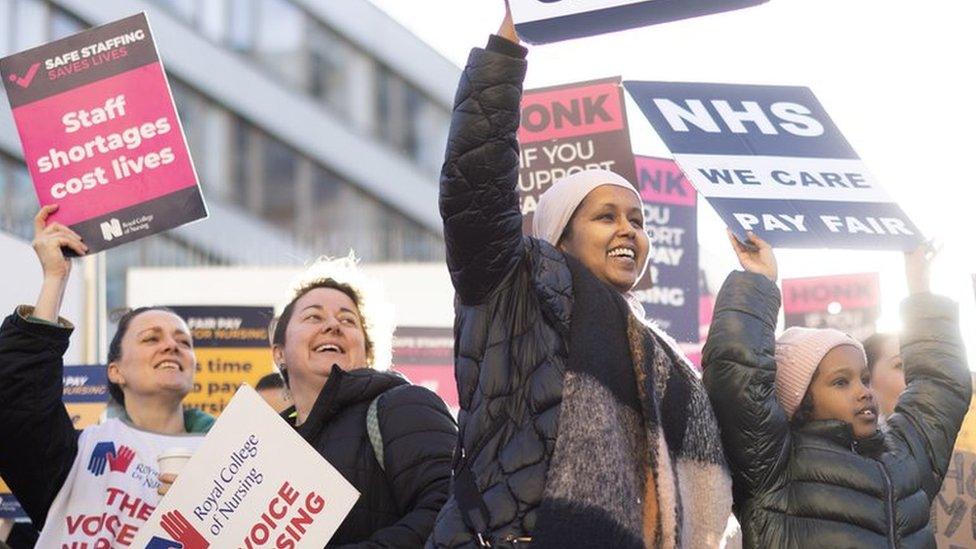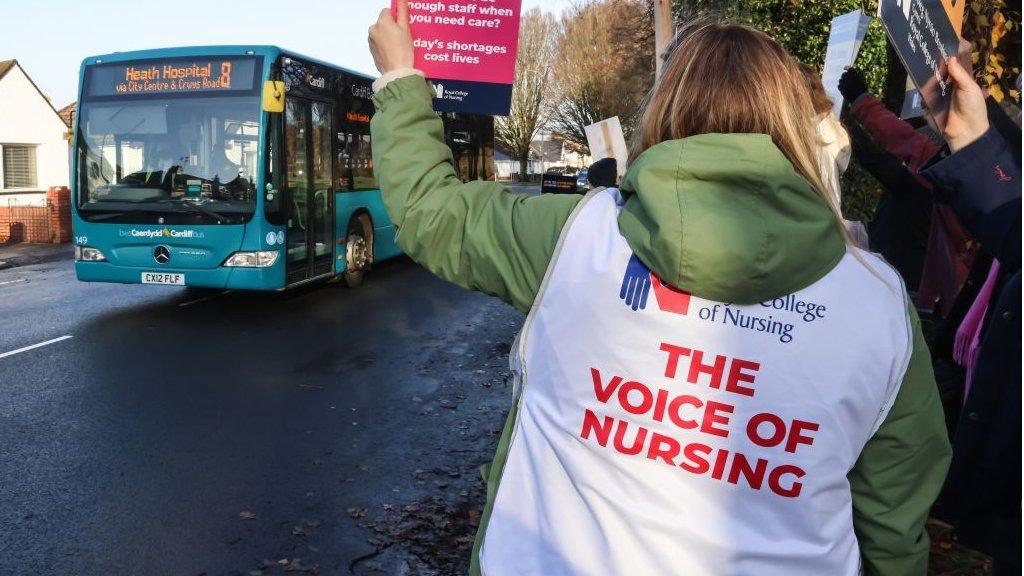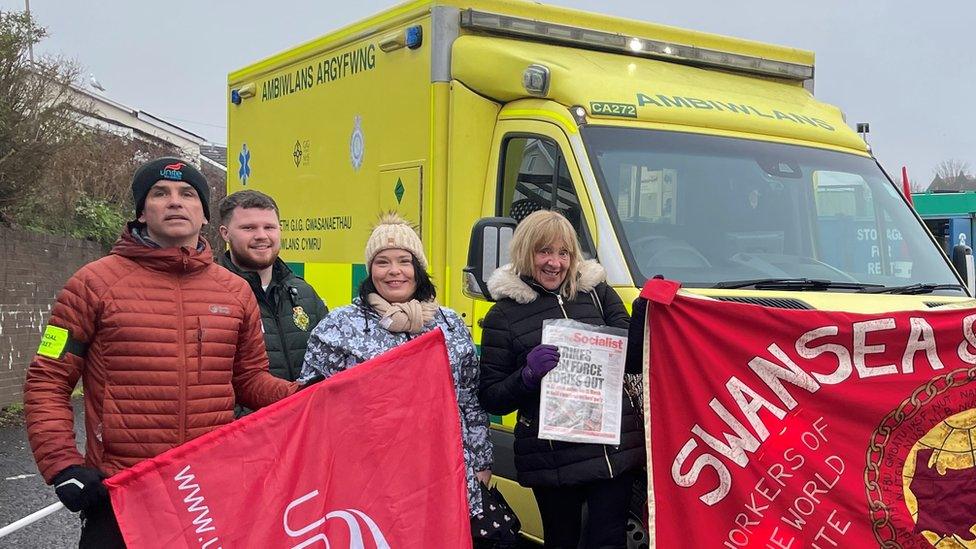NHS strikes: Welsh government offers unions new deal
- Published
- comments

Nurses held a round of strikes in Wales in December
A pay deal with a "significant enhancement" on the original will be put to NHS workers after talks with unions, Wales' health minister said.
It now includes a one-off 3% payment, backdated to last year, and a 5% offer from the start of this month.
Unite said it was still below inflation while the Royal College of Nursing (RCN) said it was less than it wanted.
Eluned Morgan said it meant the lowest paid staff would get a starting salary of £22,720 or £11.39 an hour.
Ms Morgan said negotiations had been tough but she was "very grateful for the positive attitude taken in discussions in arriving at this best and final offer".
Unite, which will begin balloting its members in May, said the pay offer fell short of inflation so did not address cost of living concerns, but was a "significant improvement".
Although it has not recommended which way members should vote on the offer, Unite has paused industrial action.
Unison has encouraged its members to vote for a deal it called the "best that could be achieved through negotiation".
In March, nurses rejected an improved pay offer from the Welsh government aimed at averting further strikes.
Midwives also voted against the government's last offer, as did ambulance workers represented by the GMB and Unite unions.
RCN director Helen Whyley said that, while the new offer "doesn't come close enough to the pay award our members have been campaigning for", it was now up to members to make their own choice.
Speaking on BBC Radio Wales on Friday, she said: "We should acknowledge the Welsh government only returned to negotiations because of the momentous pressure placed on them by NHS and nursing in NHS Wales.
"There are members who are living out of food banks and finding the cost of living challenges hugely difficult, things like making sure the children have got shoes for school.
"For those members, the money may well be where they see a way forward.
"But for others they will be considering whether this offer is enough to ensure that their colleagues stay next to them and don't leave the NHS and go work on agency, and whether it's to keep them themselves nursing for the future."
Ms Whyley said a consultative ballot will open next week and should take less than three weeks.
Speaking on BBC Radio Cymru's Dros Frecwast, Plaid Cymru's spokesman on health Rhun ap Iorwerth said: "It is clearly better than the offer that was originally put on the table, but still far below what would be needed to bring wages back to what they were around 2008, they are still below inflation rates."
The previous deal offered eight health unions an extra 1.5% rise and a further 1.5% as a one-off payment, on top of the £1,400 already promised.
Other unions have been asked to comment.

Analysis by BBC Wales political reporter Adrian Browne
Despite improvements in waiting times for hospital treatment, the Welsh health service remains under huge pressure, and Labour ministers will, of course, be desperate to end strikes by NHS workers.
Ministers say they have done all they can to find more money for pay within their budget constraints.
Yet, when prices have been rising to such an extent, it's no surprise union leaders aren't exactly dancing in the streets about an offer of 5%, albeit with a 3% one-off payment backdated to last year.
The Welsh government says the deal is worth much more than that, when all the elements of the offer over two years are taken into account.
The trade unions stress this isn't just about their members' pay, but also the ability of the NHS to attract and retain staff.
Union members will vote over the coming weeks, weighing up for themselves whether it will be possible to wring any more money out of the Welsh government, or whether this really is as good as it gets.
- Published4 April 2023

- Published10 February 2023

- Published28 February 2023

- Published8 March 2023
